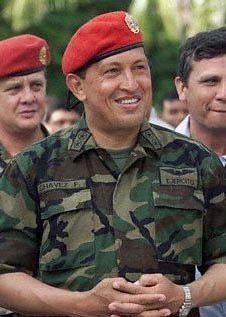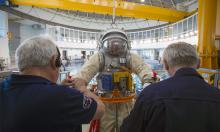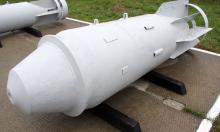Washington tries to frustrate Russo-Venezuelan military alliance
Caracas is expected to replace old US and European combat aircrafts by 50 new Russian MIG-29SMT Fulcrum

During a visit to Moscow in late November, Venezuela's President Hugo Chavez announced his country was planning to modernize its Armed Forces by replacing old European / US equipment with sophisticated hi-tech Russian weaponry. "We are modernising and strengthening our armed forces against any form of aggression. We are talking about deliveries of 100,000 Russian machineguns," Chavez told a news conference at that time.
However, it became known later that the operation is far more ambitious than expected. According to the Brazilian newspaper O Estado de Sao Paulo, Chavez is ready to buy up to 50 new Russian MIG-29SMT Fulcrum combat aircrafts, 40 Mi-35 helicopters and 100,000 AK-47 assault rifles in an operation estimated in $8 billion.
According to the Brazilian daily, the strengthening of the Venezuelan army has created concern among top Washington diplomats and its closest ally in South America, the right-wing Colombian administration of President Alvaro Uribe. Colombia and Venezuela share a 2,200 km border plenty of low scale incidents as it is a ground for the actions of Colombian irregular forces.
Quoting sources at the US intelligence services, O Estado de Sao Paulo says Venezuela is also building a radar network all along its border with equipment provided by Ukraine and China. Despite earlier speculations, Brazil, the southern neighbour of Venezuela is not concerned on these developments. “We see the operation as an internal affair of a friendly nation”, O Estado de Sao Paulo quoted Brazil’s vice-President, Jose Alencar as saying.
However, the local press speculated about a rising concern among other South American nations ahead of a military escalate in the region. A day after Mr. Chavez made his statement in Moscow, the Colombian congressman Carlos Julio Gonzalez in charge of the Defense commission said he would call for a special session to discuss the modernization of the Venezuelan Army. “We are concerned on the operation as it is not only a tactical plan, but also part of an offensive programme in view of the quantity and the quality of the equipment”, he said.
Also quoting US sources, O Estado de Sao Paulo said Washington would “closely follow the operation”, as per declared by the communications director of the US National Security Council, Sean McCormack. Even the incumbent US State Secreatry for Latin America, Roger Noriega, had something to say about that: “I think that Venezuela's bordering nations may have something to say about Chavez's decision to purchase combat aircrafts to Russia”.
Noriega's statement came as green light for US allies in South America to challenge the operation and points out directly to Bogota. Colombia hosts the US second largest embassy in the world, only behind Washington's diplomatic representation in Baghdad. Since 2000, the United States has provided Bogota with $3.3 billion in mostly military assistance, and President Bush promised more when he visited Colombia on Nov. 22. It is, indeed, Latin America's main destiny of US military aid.
It is not possible to even think about an armed conflict between Colombia and Venezuela at this time. But, with Colombia being permanently aided by Washington is normal that Venezuelans believe they need to balance the military power of its neighbour.
Always according to US sources, Venezuela's military counts with 56,000 officers, split as follows: 34,000 belong to the Army, 15,000 to the Navy and 7,000 to the Air Force. Peru and Venezuela are the only countries in the region operating new combat aircrafts.
Subscribe to Pravda.Ru Telegram channel, Facebook, RSS!





